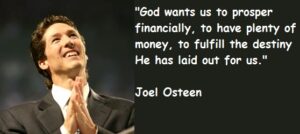 When one of the most popular Christian leaders in America focuses more on self-improvement, personal finances, and positive thinking than on the essential doctrines of the faith such as repentance from sin, sanctification, and the atoning work of Jesus Christ, there’s a problem. The prosperity gospel preached by men such as Joel Osteen has been described as biblically anemic theology. And millions have fallen for it.
When one of the most popular Christian leaders in America focuses more on self-improvement, personal finances, and positive thinking than on the essential doctrines of the faith such as repentance from sin, sanctification, and the atoning work of Jesus Christ, there’s a problem. The prosperity gospel preached by men such as Joel Osteen has been described as biblically anemic theology. And millions have fallen for it.
It’s like a caffeine or sugar high with the nutritional value of cotton candy, but make no mistake: it can be quite lucrative for those preaching it. A friend of mine visited his church and said there were no crosses and there was no mention of Jesus. He may be sincere, he may be naive; but he will be held accountable by God for what he preaches.
Lakewood Church in Houston church rakes in about $70 million a year. For his latest book, Joel Osteen received a $13 million-dollar advance. One book. He and his wife have a fortune estimated at $60 million. His 17,000 square-foot mansion is listed at $10.7 million and has six bathrooms, five fireplaces, three elevators, a swimming pool, guest house, and parking for 20 cars – including his $230,000 Ferrari.
Thinking positive sure is better than negative, and money itself isn’t bad. There are plenty of generous people who do great things for God with their finances; but the Bible warns about loving money.
Pursuing happiness isn’t wrong, but happiness can depend on your circumstances in life. Holiness, on the other hand, is a result of obedience; seeking the kingdom of God first and walking with Jesus daily.
People who practice Joel Osteen’s formula for success and then get cancer or fail to get the expected results end up disillusioned or worse; they blame God! It might feel good short term, but many people get angry at God if things don’t work out the way they want them to and they fall away from Him.
Rather than catering to self, the Bible teaches us to surrender our lives to Christ. The Gospel of Luke 9:23-24 quotes Jesus as saying:
“If anyone wishes to come after Me, he must deny himself, and take up his cross daily and follow Me. For whoever wishes to save his life will lose it, but whoever loses his life for My sake, he is the one who will save it.”
The true Christian faith is honest right up front because the road to eternal life is narrow and hard. The Bible promises persecution, trials, and that people will hate you. Jesus said we will have trouble in this world.
President of Southern Baptist Theological Seminary, Dr. Albert Mohler offered some insightful comments on a recent an article in The Financial Times in which the writer destroys Joel Osteen’s brand of Christianity and contrasts prosperity theology with teachings in Scripture. The author is not even a believer.
Editor of The Financial Times, progressive writer Edward Luce, visited Lakewood Church in Houston and interviewed Osteen. Luce writes about what he sees as a contradiction between Joel Osteen’s preaching and the historic, orthodox Christian faith. He calls Lakewood, “the most significant temple to the prosperity gospel in America.”
When Luce checked out a men’s group there, he came away with “buzz words” such as: optimism, hope, destiny, harvest, bounty, and of course, prosperity.
The article points to the glaring absence of crucial theological terms:
“Words that are rarely heard include guilt, shame, sin, penance and hell. Lakewood is not the kind of church that troubles your conscience.”
It might work for some, but why don’t more people see that prosperity theology is not centered on God and his glory, but the glory of man, on this life, and is a psychological message aimed at making people feel better about themselves?
It is true God loves us. He cared enough to send Jesus to a brutal, torturous death on a cross. With prosperity teachings however, “meaning and identity have shifted away from the self-revealing, self-existing God and towards the self-important, self-worshiping individual whom God loves.”
A key statement by Osteen reveals much about his focus:
“If God had a refrigerator, your picture would be on it. If he had a computer, your face would be the screen saver.”
Dr. Mohler writes that the prosperity gospel shifts the emphasis of God’s love away from the praise and glory of the Creator to the praise and glory of the creature. Erasing the wrath of a holy God, Osteen reverses the entire theological order of biblical Christianity.
Colossians 1:16 reminds us we’re here for God; He doesn’t exist for our pleasure:
For by Him all things were created, both in the heavens and on earth, visible and invisible, whether thrones or dominions or rulers or authorities—all things have been created through Him and for Him.
Digging a little deeper on his visit to Houston, Edward Luce asked Joel Osteen how he managed to keep sin and redemption out of his preaching, and how a message can parade as Christian when it avoids basic, necessary doctrines. Osteen said he didn’t want “to turn people off” or lay more guilt on them, and added:
“It’s not my aim to dwell on technicalities. I want to help people sleep at night.”
 Can you imagine Jesus or any of the disciples saying this? Osteen’s teaching is pop psychology that resembles the mantras of Oprah rather than the gospel of Jesus Christ.
Can you imagine Jesus or any of the disciples saying this? Osteen’s teaching is pop psychology that resembles the mantras of Oprah rather than the gospel of Jesus Christ.
When an unbeliever writing for a secular publication can see this but Christians don’t get it, our biblical illiteracy is showing.
Osteen has also been quoted as saying,
“If you do your part, God will do his. He will promote you. He will give you the increase.”
For those who don’t know what the Bible teaches, how could they hear this and not think Christianity if a religion that’s all about us and what we can get?
God already did His part by raising Jesus from the dead and sending the Holy Spirit to help believers. Nowhere does Scripture suggest if we just do our part, God will respond.
Osteen’s ‘gospel’ of your best life now, happiness, health and wealth and blessings lacks depth and substance. What does it offer those with terminal diseases, the homeless, U.S. Veterans with missing limbs and PTSD, parents with kids in children’s hospitals, confused teenagers, broken families, the depressed or hopeless including those who are suicidal?
Dr. Mohler says Osteen proclaims not the gospel – but a false hope. He concludes:
And the central problem of the prosperity gospel is not that it offers too much, but that it offers too little. The gospel of Jesus Christ brings salvation, the forgiveness of sin, and life everlasting; …Osteen tragically exchanges the hope of a gospel centered on Christ and his accomplished work – for a wishy-washy, self-centered, self-exalting message of psychotherapy. He turns the eyes of his audience away from the glory of the eternal God to a god who is a cosmic butler;
Joel Osteen’s message appeals to a materialistic, spoiled culture, doesn’t it? It seduces the already lukewarm church in the United States of Laodicea.
In what does your security rest? A house, savings, investments, retirement plan? These will all pass away, but the word of the Lord endures forever. One problem with riches is that they encourage a spirit of false independence, very much like the church of Laodicea which Jesus rebuked. He said they were a lukewarm. Revelation 3:17 states:
Because you say, ‘I am rich, have become wealthy, and have need of nothing’—and do not know that you are wretched, miserable, poor, blind, and naked…
How much does this sound like American Christianity and ‘Your Best Life Now’ theology? The poison of the prosperity gospel is just one of many false teachings leading us to expect or even demand God bless us – and in the way we desire.
Who wouldn’t want their faith to be a magic wand of sorts to create what we imagine and visualize? That’s the kind of thing we want to hear, but it’s not based on truth and it’s not what we need to hear.
2 Timothy 4:3-5 warns professing believers in the church:
For the time will come when they will not endure sound doctrine; but wanting to have their ears tickled, they will accumulate for themselves teachers in accordance to their own desires, and will turn away their ears from the truth and will turn aside to myths. But you, be sober in all things, endure hardship;
I recently preached a message from Matthew chapter 19 about the rich young ruler who came to Jesus seeking eternal life only to walk away in grief and sorrow because he could not let go of his possessions. Money was his idol. And Jesus said it is extremely difficult for the rich to be saved. Not impossible; but difficult.
Are riches are an obstacle to the kingdom of heaven? For some, yes. In America today, who among us would not be considered rich compared to the world? Why is wealth such a problem when it comes to eternal things? Because it tends to make us satisfied with this life, instead of longing for the age to come.
Randy Alcorn stated:
“He who lays up treasures on earth spends his life backing away from his treasures. To him, death is loss. He who lays up treasures in heaven looks forward to eternity; he’s moving daily toward his treasures. To him, death is gain.”
Context, theology, and expository teaching aren’t the only things prosperity preachers tend to avoid. They typically stay away from so-called social and political issues like abortion and homosexuality, and they rarely touch on cults and world religions. I wrote about this in a chapter called “Counterfeit Christianity” for my 2012 book, ERADICATE.
Back when Mitt Romney was running for president, Joel Osteen was interviewed several times and asked why he doesn’t get involved in politics or talk much about the most pressing, controversial, cultural issues. Ready for his answer? Osteen said he didn’t feel comfortable, and that “I don’t feel like that’s my main gifting.” So, only people with a special gift can address hot topics? Osteen also stated:
“When you focus on being a blessing, God makes sure that you are always blessed in abundance.”
In a Washington Times interview, he responded by saying he didn’t like to take sides and prefers to “stay in my own lane.” Then came questions about Romney being a LDS (Mormon), and Osteen said he believes Mormons are Christians, but added that he didn’t know if it’s the “purest form of Christianity, like I grew up with.”
In an earlier interview, Chris Wallace of (then) Fox News asked Pastor Joel, “Is a Mormon a true Christian?”
OSTEEN: “Well, in my mind they are. Mitt Romney has said that he believes in Christ as his Savior, and that’s what I believe, so, you know, I’m not the one to judge the little details of it. So I believe they are. And so, you know, Mitt Romney seems like a man of character and integrity to me….”
WALLACE: “So, for instance, when people start talking about Joseph Smith, the founder of the church, and the golden tablets in upstate New York, and God assumes the shape of a man, do you not get hung up in those theological issues?”
OSTEEN: “I probably don’t get hung up in them because I haven’t really studied them or thought about them. And you know, I just try to let God be the judge of that. I mean, I don’t know…
So let’s review: Pastor Joel Osteen feels it is not his calling to get deeply into the Bible or to talk about sin. He also prefers not to think too much about other religions, but he believes Mormons are Christians. Okay. Got it.
In his New York Times best-selling book, Your Best Life Now, Osteen stated:
“The first step to living at your full potential is to enlarge your vision; seeing yourself rising to new levels. …See your dreams coming to pass. You must conceive it and believe it is possible if you ever hope to experience it”
“You will produce what you’re continually seeing in your mind…. If you develop an image of victory, success, health, abundance, joy, peace, and happiness, nothing on earth will be able to hold those things from you … God wants to increase you financially, by giving you promotions, fresh ideas and creativity” (p. 4, 5).
Our struggle is not against flesh and blood (Eph. 6:12), and Joel Osteen is not the enemy. He will be judged and for that, I certainly do not envy him. This could be so much more extensive, and we could name dozens of men (and women) preachers, list more quotes and strengthen our case. (Copeland, Dollar, Duplantis, Hinn, Meyer, etc.)
With great wealth comes great responsibility. Jesus viewed wealth as a gift from God. Luke writes:
“No one can serve two masters. For you will hate one and love the other, or be devoted to one and despise the other. You cannot serve both God and money.” (Luke 16:13-31)
Only God knows the hearts of those who preach watered-down doctrines such as word-faith and the prosperity gospel, but those who are teachers will be held to a much higher standard (James 3:1) by the Lord who exalts His precious Word. To embrace and follow Christ, we must hold the things of this life loosely and set our hearts on things above (Col. 3:1-3).
The Apostle John wrote:
Do not love the world or the things in the world. If anyone loves the world, the love of the Father is not in him. (1 John 2:17)
The gospel that Joel Osteen and many others preach barely resembles the hard teachings of Jesus Christ and the true gospel. Pray for discernment for those who have fallen for this deception, and pray for God’s mercy for those who are peddling it. And let’s examine our own hearts because in the end, these charlatans have to answer to the God they claim to represent; and so will we.
Video courtesy of Freedom Project Media
Counterfeit Christianity: Joel Osteen and the Gospel of Neutrality
Joel Osteen Rebukes the Apostles
How does a Good (or rich) Person Inherit the Kingdom of Heaven?

